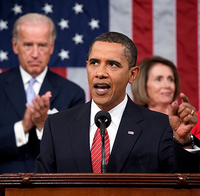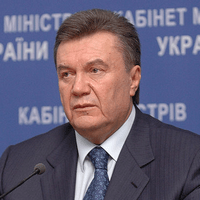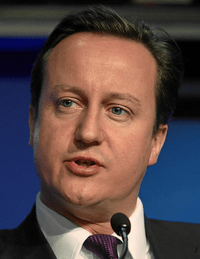In a press briefing during French President Nicolas Sarkozy’s visit to the White House, President Barack Obama highlighted the two nations close relationship and alignment on many key issues such as trade (emphasizing the importance of moving the Doha Round forward), nuclear non-proliferation, and holding a hard line with Iran. In turn, Sarkozy discussed his deep commitment to the new Afghanistan strategy and his appreciation for Obama’s support in his G-20 presidency.
Europe Archive
Free Newsletter

The recent conclusion of a new bilateral strategic arms treaty between the United States and Russia is important for both countries’ security. Yet seen through the prism of nuclear disarmament, it is but a baby step. More substantial progress toward the vision of a world free of nuclear weapons will only come to fruition if a key group of non-nuclear-weapon states help defuse tensions between the nuclear haves and the have-nots. The prime candidates for this job are the states often referred to as middle powers, including Ireland, New Zealand, Germany and Sweden. These nations have a history of activist […]
I had the pleasure of participating last Friday in France 24’s panel discussion week-in-review program, The World This Week. The other participants were Matthew Saltmarsh of the International Herald Tribune, Paul Taylor of Reuters, and Esther Leneman of the French radio station, Europe 1. You’ll have to sit through a patch at the beginning where we all struggle to find something intelligent to say about the Catholic Church’s child sexual abuse scandal. (Saltmarsh got called on first since, uh, well . . . Let’s just say that Judah and Esther are giveaways, and Paul apparently is of the Tribe as […]
I’ve been trying to gather my thoughts about why I felt so underwhelmed by Friday’s announcement that the U.S. and Russia had agreed to terms on the START follow-on treaty. Certainly, the optics work well for both sides. President Barack Obama gets a foreign policy feather to go along with health care reform in his victory cap. And Russian President Dmitry Medvedev gets to show what the good cop in Moscow’s good cop/bad cop routine looks like. And arriving at the upcoming NPT conference with the treaty in hand certainly helps Obama avoid a major embarrassment. But I’m not convinced […]
To follow up a bit on Friday’s post about the EU’s latest “non-solution solution” to the Greek debt crisis, I’d add that in choosing pragmatism over theology, the decision is pretty consistent with the history of European construction. If the distant horizon of European integration has historically been defined by Europhile “theologians,” actual construction has always been driven by pragmatists. Part of that has to do with the nature of political compromise. But part of it also has to do with the the role that crisis has played in driving European construction. And although crisis often provokes religious thinking, it […]
The EU once again agreed to support Greece in a vaguely outlined but yet-to-be-determined way. I’ve actually lost track of how many symbollic expressions of support that makes, but three sounds right. This time, however, not only did German Chancellor Angela Merkel win out on her insistence to include the IMF in any eventual bailout, she also managed to hold on to a future veto for actually implementing the agreed-upon mechanism. What’s more, she got a commitment in writing to explore ways of strengthening oversight of EU member states’ budgetary discipline, which is being described as “economic governance,” but represents […]

Some foreign policy analysts believe that President Barack Obama’s legislative victory on health care reform this week will have a positive impact on his ability to make progress in the foreign policy realm as well. Clearly, Obama’s credibility in the eyes of foreign governments would have been severely — perhaps even irreparably — damaged had he failed to pass the flagship legislation of his domestic agenda, despite overwhelming Democratic majorities in both houses of Congress. But the White House is not out of the woods just yet. For the president to build on the momentum he gained from the health […]
My recent prediction that Germany would be the big loser from the Greek debt crisis might have been premature. Although in all fairness, with this story pinballing back and forth every 10 minutes or so, any prediction is simultaneously premature and outdated the moment it is uttered. Be that as it may, although German Chancellor Angela Merkel is certainly emerging as the “bad guy” in this game of Greek poker, she’s not necessarily losing. In fact, her approach seems to be to nod her head, Yes, to each new proposal, while uttering the word, No. Guarantee EU support for Greece? […]
Once again, the continuing back and forth on an EU-U.S. bank data-sharing deal is illustrative of some potential post-Lisbon shifts in the EU’s wish list. In particular, it looks like reciprocity is the new transparency: Last month, the European Parliament blocked a provisional deal between the European Union and Washington to permit the continued exchange of such data. The move by Parliament was partly a bid to assert new powers to decide issues concerning European security jointly with E.U. governments. But the move also reflected deepening unease in Europe over the way personal data are increasingly used by companies and […]
Writing at East Asia Forum, Tokyo University’s Takatoshi Ito argues that China’s housing bubble is worse than what’s being let on and that the measures Chinese authorities are taking will not be adequate for a soft landing. In particular, he traces China’s resistance to allowing the yuan to appreciate to a misreading by Chinese authorities of Japan’s “lost decade”: Many Chinese officials tell us that they believe the origin of Japan’s stagnation for the 20 years after its [1980s] housing bubble burst lies in its failure to stand up to US pressure for the yen to appreciate . . . […]
Over at European Goestrategy, James Rogers illustrates his paper on EU member states’ overseas military installations (.pdf) with a video that graphically drives his point home: As the video shows very clearly, these military stations cover the world. They could surely form the cornerstone of any future European Union ‘forward presence‘ or ‘global posture’ as part of a yet-to-bemaritime geostrategy. And so long as Britain and France hold onto them, these overseas military facilities could become even more of an asset than they already are for Europeans, especially if the world becomes increasingly multipolar and more competitive — not least […]
Secretary of State Hilary Rodham Clinton discusses U.S.-Russia relations on a trip to Moscow. Clinton said there has been significant progress on a post START treaty and expects a new agreement to be forthcoming. She also said that the U.S. and Russia have been collaborating on various issues of international import such as a diplomatic solution to Iran and Middle East peace talks.

There is little doubt that as president of Ukraine, Viktor Yanukovych will decisively shift the country’s geopolitical posture, with Kiev once again moving closer to Moscow after its pro-Western and pro-EU turn of 2005. The potential consequences on the EU’s energy future are serious, as 80 percent of Russian natural gas exports to Europe transit through Ukrainian territory. The country has been in repeated price disputes with the Russian state-owned gas monopoly, Gazprom, resulting in interruptions of deliveries to the Ukrainian market in January 2006 and 2009, with supplies to Europe affected both times. Mediation on the part of the […]
The U.S. and EU are bitterly divided over hedge fund regulations that the U.S. calls protectionist. (It turns out the EU is bitterly divided over the regulations, too, but let’s set that aside for now, in order to facilitate my argument.) Meanwhile, the EU is bitterly protesting the U.S. Air Force tanker contract debacle, which it says illustrates U.S. hypocrisy on said protectionism. And all this is taking place in the context of longstanding EU complaints that the U.S. has deliberately allowed the dollar to slide, to the detriment of euro-zone exporters. (Again, let’s set aside the euro’s recent tumble […]
You’ll probably see a lot of headlines today about how French President Nicolas Sarkozy took a beating in the first round of France’s regional elections yesterday. Take it with a grain of salt. Abstention hit a record in the low 50 percent range (i.e., most voters stayed home), the election was an off-year regional affair with no national impact, and it’s hard to imagine any incumbent doing that well in the current economic climate. It’s also unclear whether the Socialists and the Green coalition that came in third nationally will be able to work together to cut the necessarily deals […]
Germany. Whether it’s the gathering meme blaming German trade imbalances and “hidden” protectionism (labor cost competition) for the current crisis, or the increasing likelihood that the monetary/debt crisis will drive further EU budgetary coordination and economic government, the Germans are looking more and more like they’ll turn out to be the big losers from the Greek debt crisis. After the Greeks, that is — and even there, I’m not so sure.

The outcome of the U.K.’s upcoming general election is no longer a foregone conclusion, with the opposition Conservative Party’s steady lead in opinion polls recently narrowing. An election date of May 6 has been floated, leaving plenty of time for the usual twists and turns of election campaigning. All the same, given Prime Minister Gordon Brown’s political difficulties and popular fatigue with the Labour Party’s long grip on power, a Conservative win is certainly plausible. So what would be the implications of a Conservative victory on foreign and development policy? Answering this question is tricky, not least because a consistent […]
